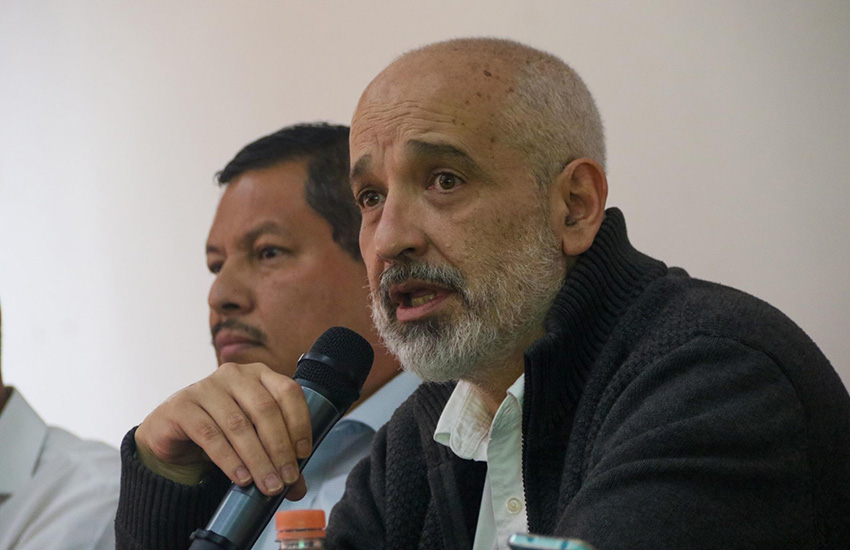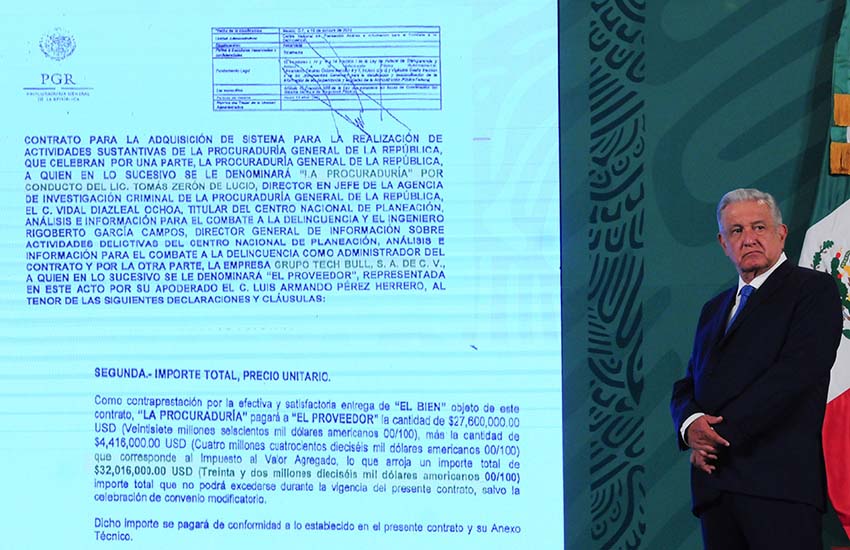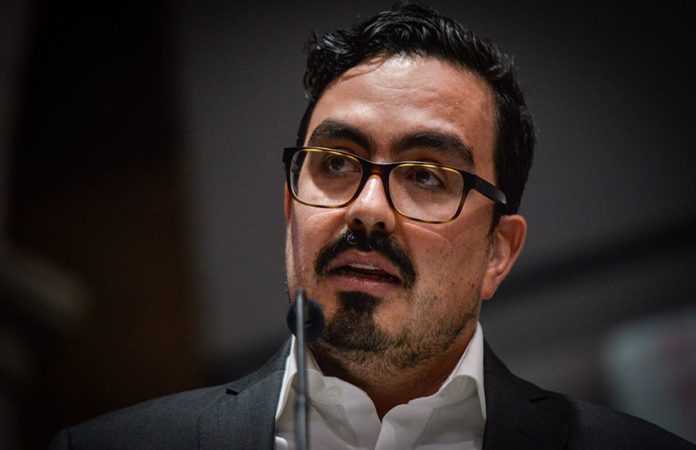Press freedom advocacy organization Article 19 announced Monday that it had filed a criminal complaint against the Ministry of National Defense (Sedena) for allegedly intercepting the private communications of a human rights defender and two journalists by using spyware to infiltrate their cell phones.
The announcement came after three civil society organizations including Article 19 published an investigation titled Ejército Espía (The Spying Army) that found that Sedena illegally used Pegasus spyware against journalists and human rights defenders in 2019, 2020 and 2021.
The Citizen Lab at the University of Toronto in Canada and the Mexican media outlets Animal Político, Aristegui Noticias and Proceso collaborated on the investigation, which gathered evidence that shows that Sedena purchased the spyware during the current government despite President López Obrador’s pledge that his administration wouldn’t spy on citizens and assertions that it isn’t doing so.
“The investigation, by Red en Defensa de los Derechos Digitales (R3D), Article 19 Mexico and Central America, and SocialTIC, with forensic analysis and support from Citizen Lab, found the new cases of surveillance occurred during the current government … despite repeated reassurances from the president that the government did not have current contracts with the [Israeli company] NSO Group, which manufactures the [Pegasus] spyware,” Article 19 said in a statement.

“The report reveals that Raymundo Ramos, president of the Nuevo Laredo Human Rights Committee, Ricardo Raphael, journalist and writer, and a journalist from Animal Político were all targeted,” the NGO said.
“The investigation exposes the existence of contracts between the Mexican army and the company Anstua, which signs agreements on behalf of the NSO Group. The journalists and a human rights defender were conducting investigations into serious human rights violations committed by the armed forces at the time they were targeted,” it said.
“Article 19 has filed a complaint with the Attorney General’s Office [FGR] for the illegal interception of private communications. However, there is little confidence that the Attorney General’s Office will conduct the investigations with independence and professionalism.”
Leopoldo Maldonado, Article 19’s Mexico and Central America director, told a press conference Monday that either López Obrador has knowingly lied about his government not spying on citizens or Sedena is using the spyware behind his back.
Raphael, one of the three espionage victims identified by the Ejército Espía investigation, said that the findings of the probe demonstrated that Mexico’s intelligence apparatus is dominated by the military, although the FGR has also purchased software to conduct cell phone and internet espionage in recent years, according to a 2021 report by the newspaper El País.
The journalist said that his personal communications were passed on to other people for undisclosed reasons. He said that filing a criminal complaint against Sedena was necessary, but noted that he has little faith that Attorney General Alejandro Gertz Manero will oversee a rigorous investigation.
“I don’t believe in the attorney general,” said Raphael, who contributes to media outlets including Proceso and the newspaper Milenio.
Animal Político director Daniel Moreno told the same press conference that the espionage was illegal as none of the three identified victims had broken the law. He added that the infiltration of the telephone of the unnamed Animal Político journalist gave the army access to the entire operations of the news website.

Ramos, the human rights defender, said that he has been under surveillance by the army for more than 20 years as a result of his work investigating human rights violations committed by the armed forces in the northern border state of Tamaulipas.
“They won’t stop us because they infect our … [phones],” he said.
The espionage victims and the organizations involved in the investigation urged other activists and journalists to check their phones for signs they were also targeted by Sedena’s alleged use of Pegasus, spyware that the previous government also used.
After the newspaper The Guardian reported in July 2021 that at least 50 people close to López Obrador, among many others, were potentially targeted by the previous administration of president Enrique Peña Nieto after it purchased Pegasus, the president declared that government espionage was a thing of the past and ordered the cancelation of any active Pegasus contract.
On Tuesday he rejected the revelation that his government is using Pegasus to spy on journalists and activists.
“We’re not the same as the previous [governments], it’s not true [that we’re spying]. I made the commitment that no one would be spied on,” López Obrador told his regular news conference.
He said that the army – which has been given responsibility for a wide range of non-traditional tasks during the current government – carries out intelligence work but doesn’t spy. Espionage is “different,” López Obrador said before reiterating that his government doesn’t spy on opponents.
“What our adversaries are seeking is to compare us with those who governed previously but we’re not the same,” he said.
The publication of the Ejército Espía investigation came just days after it was revealed that the army was targeted by the international hacking collective Guacamaya, which stole a range of sensitive information from Sedena’s IT system including details about the president’s medical problems.
Article 19 said “the facts” the Ejército Espía probe reveals “must not go unpunished.”
“It is essential to clarify how many people have been spied on, which officials participated or had knowledge and how the information obtained has been used, including with whom it has been shared,” it said.
With reports from Animal Político and Expansión
